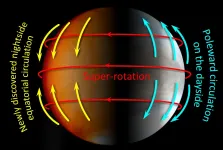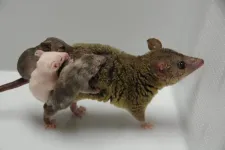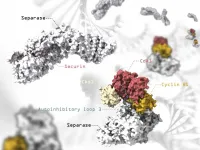(Press-News.org) A new University of Chicago study has found that the drug masitinib may be effective in treating COVID-19.
The drug, which has undergone several clinical trials for human conditions but has not yet received approval to treat humans, inhibited the replication of SARS-CoV-2 in human cell cultures and in a mouse model, leading to much lower viral loads.
Researchers at UChicago's Pritzker School of Molecular Engineering (PME), working with collaborators at Argonne National Laboratory and around the world, also found that the drug could be effective against many types of coronaviruses and picornaviruses. Because of the way it inhibits replication, it has also been shown to remain effective in the face of COVID-19 variants.
"Inhibitors of the main protease of SARS-CoV-2, like masitinib, could be a new potential way to treat COVID patients, especially in early stages of the disease," said Prof. Savas Tay, who led the research. "COVID-19 will likely be with us for many years, and novel coronaviruses will continue to arise. Finding existing drugs that have antiviral properties can be an essential part of treating these diseases."
The results were published July 20 in Science.
A race to find COVID-19 treatments
When COVID-19 lockdowns began in March 2020, Tay and Nir Drayman, a postdoctoral fellow who specializes in virology, began to think about how they could help. To search for a better treatment for the disease, they began by screening a library of 1,900 clinically safe drugs against OC43, a coronavirus that causes the common cold and can be studied under regular biosafety conditions. They used cell cultures to determine the drugs' effect on infection.
They then gave the top 30 drug candidates to microbiology professor Glenn Randall, who tested them in cell cultures against the SARS-CoV-2 virus at the Howard Taylor Ricketts Laboratory, a BSL-3 facility at Argonne National Laboratory. Measurements in the high-containment lab revealed nearly 20 drugs that inhibit SARS-CoV-2.
They also sent the drug candidates to other collaborators to test against the 3CL protease, the enzyme within coronaviruses that allows them to replicate inside a cell. They found that of the drug candidates, masitinib completely inhibited the 3CL viral enzyme inside the cell, a fact that was confirmed by X-ray crystallography by Prof. Andrzej Jaochimaik's group at Argonne. The drug specifically binds to the 3CL protease active site and inhibits further viral replication.
"That gave us a strong indication of how this drug works, and we became confident that it has a chance to work in humans," Drayman said.
Though masitinib is currently only approved to treat mast cell tumors in dogs, it has undergone human clinical trials for several diseases, including melanoma, Alzheimer's disease, multiple sclerosis, and asthma. It has been shown to be safe in humans but does cause side effects, including gastrointestinal disorders and edema, and could potentially raise a patient's risk for heart disease.
Drug effective against variants, other viruses
Next, the researchers worked with peers at the University of Louisville to test the drug in a mouse model. They found that it reduced the SARS-CoV-2 viral load by more than 99 percent and reduced inflammatory cytokine levels in mice.
In parallel, the researchers also began to test the drug in cell cultures against other viruses and found that it was also effective against picornaviruses, which include Hepatitis A, polio, and rhinoviruses that cause the common cold.
They also tested it in cell cultures against three SARS-CoV-2 variants, Alpha, Beta, and Gamma, and found that it worked equally well against them, since it binds to the protease and not to the surface of the virus.
Now, the team is working with the pharmaceutical company that developed the drug (AB Science) to tweak the drug to make it an even more effective antiviral. Meanwhile, masitinib itself could be taken to human clinical trials in the future to test it as a COVID-19 treatment.
"Masitinib has the potential to be an effective antiviral now, especially when someone is first infected and the antiviral properties of the drug will have the biggest effect," Drayman said. "This isn't the first novel coronavirus outbreak, and it's not going to be the last. In addition to vaccines, we need to have new treatments available to help those who have been infected."
INFORMATION:
Other authors on the paper include Jennifer K. DeMarco, Krysten A. Jones, Saara-Anne Azizi, Heather M. Froggatt, Kemin Tan, Natalia Ivanovna Maltseva, Siquan Chen, Vlad Nicolaescu, Steve Dvorkin, Kevin Furlong, Rahul S. Kathayat, Mason R. Firpo, Vincent Mastrodomenico, Emily A. Bruce, Madaline M. Schmidt, Robert Jedrzejczak, Miguel Á. Muñoz-Alía, Brooke Schuster, Vishnu Nair, Kyu-yeon Han, Amornrat O'Brien, Anastasia Tomatsidou, Bjoern Meyer, Marco Vignuzzi, Dominique Missiakas, Jason W. Botten, Christopher B. Brooke, Hyun Lee, Susan C. Baker, Bryan C. Mounce, Nicholas S. Heaton, William E Severson, Kenneth E Palmer, Bryan C. Dickinson, and Andrzej Jaochimiak.
Citation: "Masitinib is a broad coronavirus 3CL inhibitor that effectively blocks replication of SARS-CoV-2," Drayman et. al., July 20, 2021, Science. DOI: 10.1126/science.abg5827
Funding: National Institute of Allergy and Infectious Diseases, National Institutes of Health, Department of Energy, National Institute of General Medical Sciences, Pritzker School of Molecular Engineering
Older people appear to have fewer antibodies against the novel coronavirus, a new laboratory study from Oregon Health & Science University suggests.
Antibodies are blood proteins that are made by the immune system to protect against infection. They are known to be key players in protection against SARS-CoV-2 infection.
The study published today in the Journal of the American Medical Association.
"Our older populations are potentially more susceptible to the variants even if they are vaccinated," said senior author Fikadu Tafesse, Ph.D., assistant professor of molecular microbiology and immunology in the OHSU School of Medicine.
Tafesse and colleagues emphasized that even though they measured diminished antibody ...
The average American spends 5 days each year in line by some estimates. Many of these lines are for things like a cup of coffee, movie theater tickets or a ride on the newest roller coaster, but for some the wait is for something far more pressing -- a new kidney.
In South Carolina, the average time spent on a waitlist for a kidney transplant is 42 months, but according to a recent paper in JAMA Surgery, changes to the U.S. kidney allocation system could result in reduced access to kidney transplants and longer times spent in line.
"At face value, the changes in the allocation system seem quite appropriate," said Derek DuBay, M.D., director of ...
Common yeast are able to adapt and thrive in response to a long-term rise in temperature by changing the shape, location and function of some of their proteins. The surprising findings demonstrate the unappreciated plasticity in the molecular and conformational level of proteins and bring the power of molecular biology to the organismal response to climate change. Results from the Zhou lab at the Buck Institute in collaboration with the Si lab from the Stowers Institute are published in Molecular Cell.
Temperature is an unstable parameter in the wild, affecting almost ...
Little is known about the weather at night on Venus as the absence of sunlight makes imaging difficult. Now, researchers have devised a way to use infrared sensors on board the Venus orbiter Akatsuki to reveal the first details of the nighttime weather of our nearest neighbor. Their analytical methods could be used to study other planets including Mars and gas giants as well. Furthermore, the study of Venusian weather granted by their methods could allow researchers to learn more about the mechanisms underpinning Earth's weather systems.
Earth and Venus ...
Researchers at the RIKEN Center for Biosystems Dynamics Research (BDR) have succeeded in creating the first genetically engineered marsupial. This study, published in the scientific journal Current Biology, will contribute to deciphering the genetic background of unique characteristics observed only in marsupials.
Genetically modified animals, particularly mice and rats, are extremely important tools for researching biological processes. For example, researchers often silence genes to find out what their normal functions are. Since marsupials have unique characteristics, studying them requires developing ...
During cell division, chromosomes are duplicated and separated so that one copy of each chromosome is inherited by each of the two emerging daughter cells. Correct distribution of chromosomes requires high accuracy and defects in this process can cause aberrant distribution of chromosomes and facilitate cancer development. By analyzing the structure of the protein responsible for chromosome separation, an international team, led by scientists from the University of Geneva (UNIGE), has shed light on the mechanisms controlling this essential player in cell division. This work is published in the journal ...
MIT physicists have observed signs of a rare type of superconductivity in a material called magic-angle twisted trilayer graphene. In a study appearing in Nature, the researchers report that the material exhibits superconductivity at surprisingly high magnetic fields of up to 10 Tesla, which is three times higher than what the material is predicted to endure if it were a conventional superconductor.
The results strongly imply that magic-angle trilayer graphene, which was initially discovered by the same group, is a very rare type of superconductor, known as a "spin-triplet," that is impervious to high ...
What The Study Did: This study at an institution of higher education in Colorado evaluated the association between self-reported protective behaviors and how common SARS-CoV-2 infection was among essential in-person employees during the first six months of the COVID-19 pandemic in the United States.
Authors: Tracy L. Nelson, M.P.H., Ph.D., of Colorado State University in Fort Collins, is the corresponding author.
To access the embargoed study: Visit our For The Media website at this link https://media.jamanetwork.com/
(doi:10.1001/jamanetworkopen.2021.16543)
Editor's Note: The article includes conflict of interest and funding/support disclosures. ...
What The Study Did: In this analysis of the 2015 U.S. Transgender Survey, gender-affirming hair removal procedures were associated with lower odds of past-month severe psychological distress, past-year smoking and past-year suicidal ideation.
Authors: Michelle S. Lee, B.A., of Harvard Medical School in Boston, is the corresponding author.
To access the embargoed study: Visit our For The Media website at this link https://media.jamanetwork.com/
(doi:10.1001/jamadermatol.2021.2551)
Editor's Note: The article includes conflicts of interest ...
Alexandria, Va., USA - Parach Sirivichayakul, Mahidol University, Bangkok, Thailand, presented the poster "Preventing Approximal Caries in Primary Teeth With Topical Fluorides" at the virtual 99th General Session & Exhibition of the International Association for Dental Research (IADR), held in conjunction with the 50th Annual Meeting of the American Association for Dental Research (AADR) and the 45th Annual Meeting of the Canadian Association for Dental Research (CADR), on July 21-24, 2021.
There is limited evidence regarding the use of silver diamine fluoride (SDF) for caries prevention in primary teeth. This randomized clinical trial evaluated the effectiveness of 38% SDF, 5% sodium fluoride (NaF) varnish and ...



